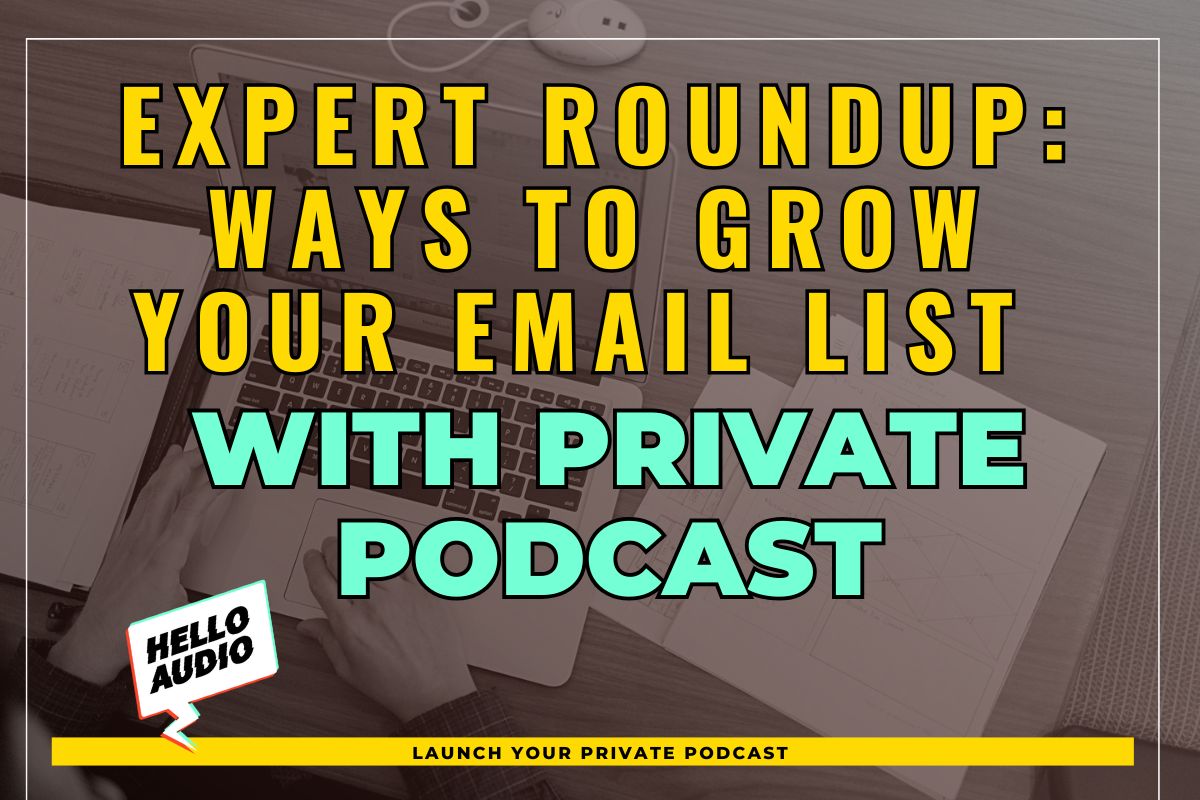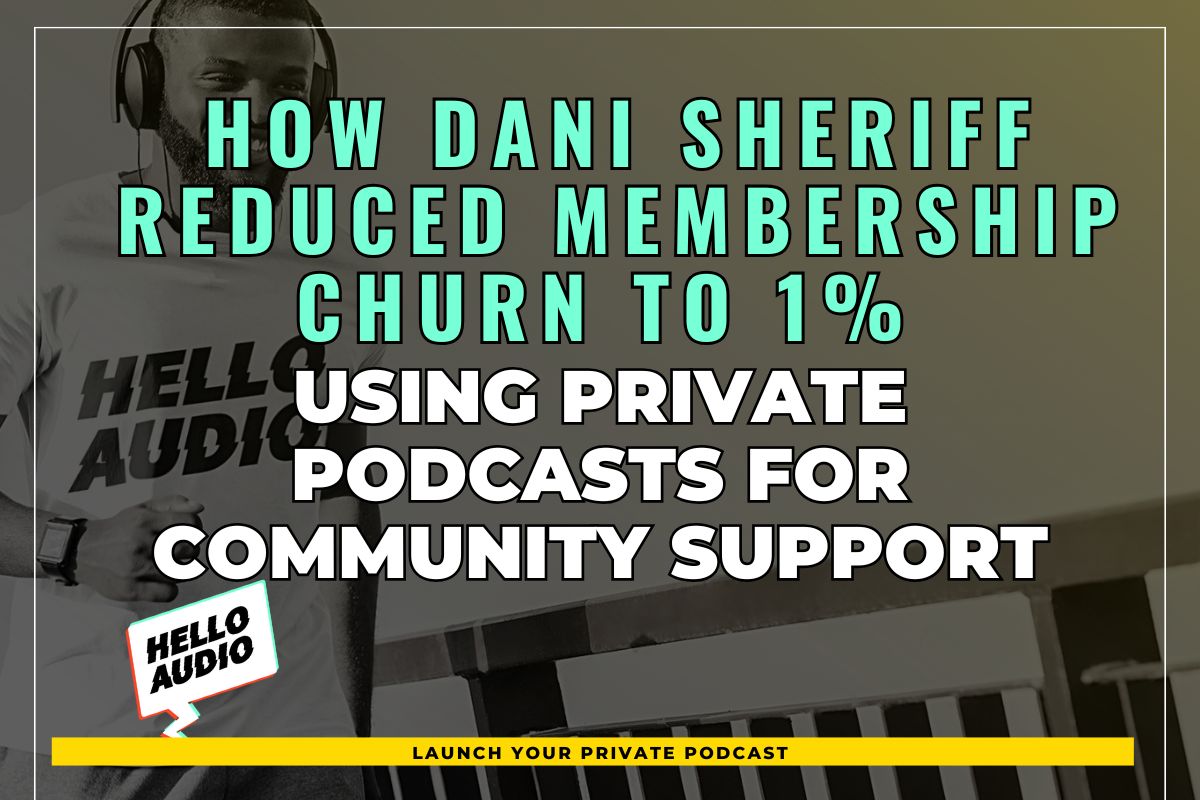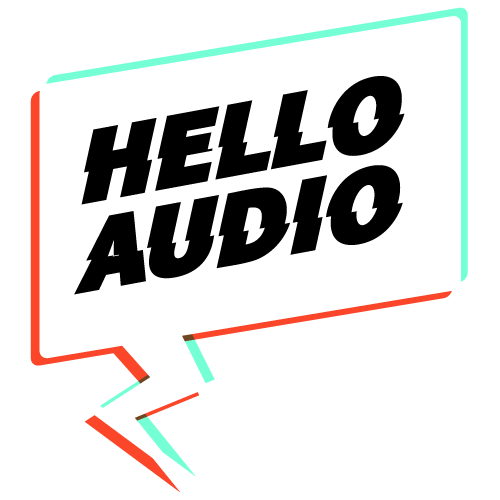We’ve officially entered the New Year — which means disorganized social media accounts and stale email lists are way past their style. Building strong online communities has become crucial to interacting with your audience and converting them into loyal brand advocates. However, the growing effectiveness is accompanied by an overwhelming list of platforms and tools one must choose from.
In this comprehensive guide, we will compare the 12 most powerful online community platforms and tools this year. Continue reading to choose the one that’ll meet your unique requirements.
TL;DR – Top 12 Online Community Platforms
Here are the top 12 online community platforms you should consider:
- Hello Audio: Converts videos into audio podcasts to increase engagement.
- Reddit: A widely popular forum network with various topics and conversations.
- Discord: A real-time chat and voice platform popular among gamers and other niche communities.
- Facebook Groups: A well-known platform for creating close-knit communities around particular fields.
- Discourse: A robust forum software with advanced features for scholarly and technical communities.
- Mighty Networks: An all-in-one platform for creating branded communities, courses, and memberships.
- Thinkific: Sells online courses with community elements as an add-on.
- Kajabi: Similar to Thinkific, but with more marketing and sales features.
- Circle: Professionals and business owners’ exclusive networking site.
- Bettermode (previously Tribe): Creates strong communities through goal-setting tools and group coaching.
- Peerboard: A knowledge-sharing website geared at professional development and mentorship.
- Podia: Mostly used to sell subscriptions and courses, with community features available as an extra.
Want to build a niche community of like-minded people? Podcasting is your way to go. Turn your media content into private podcasts in minutes with Hello Audio.
But why should you do that? To understand that, let’s look at the effectiveness of online community management tools.

What Makes an Online Community Management Tool Effective?
Creating and managing an active online community takes more than just enthusiasm and hard work. You need the right tools to organize and run your community seamlessly. Without a good tech stack, everything will be a chaotic mess.
Having said that, these are the five characteristics that make an excellent community management tool:
1. Scalability and Growth Potential
Whenever your community grows, your tool of choice should offer enough flexibility to support the growth. Choose online community platforms that can handle increasing members, chats, and data without sacrificing performance or stability.
Look for these core features:
- Flexible pricing plans to sustain community growth without unexpected cost increases.
- Easy user onboarding to let people join you without hassle.
- Enough storage and bandwidth for seamless operation—especially if you have a big user base.
2. Customization and Branding Options
Choose platforms that let you customize the interface and communicate your unique voice and brand values. This includes modifying the interface layout, color schemes, logo and even adding custom domain names.
The reason is simple – your community members will feel more connected to the brand when you personalize the whole appeal. It fosters a sense of familiarity and belonging.
3. Integration Capabilities with Other Tools/Platforms
Avoid siloed community management tools at any cost; they restrict your potential. Instead, look for alternatives that easily integrate with your current marketing, CRM, and analytics tools ecosystem–here’s why it’s needed:
- Streamlines workflows by importing data, synchronizing member information, and automating tasks across many platforms.
- Helps gain a comprehensive understanding of your community and customer involvement across multiple touch-points via unified data insights.
- Improves user experience, as your members can now access additional features and resources via integrated tools.

4. User-Friendly Interface and Ease of Use
Even the most advanced tool is a flop if it’s too complex for the average person to use.
We always recommend community management platforms with a simple, user-friendly interface. It should be easy to work on for both administrators and members. It minimizes learning curves and increases adoption rates.
The easier the tool is, the more time you’ll have to devote to making genuine connections in your community.
5. Security and Data Privacy Features
Protecting your community’s data is the first step toward building trust. Choose a tool that prioritizes strong security measures, such as:
- Data encryption to ensure that member data is securely stored and transmitted, preventing unauthorized access or breaches.
- Access control permissions to restrict data visibility (depending on user roles and responsibilities, of course).
- Compliance with applicable Data Privacy laws and regulations, including the CCPA and GDPR.
Best Online Community Platforms
Are you ready to build your brand’s online community from the ground up? Let’s look at twelve of our best platforms that you could start your journey with:
1. Hello Audio
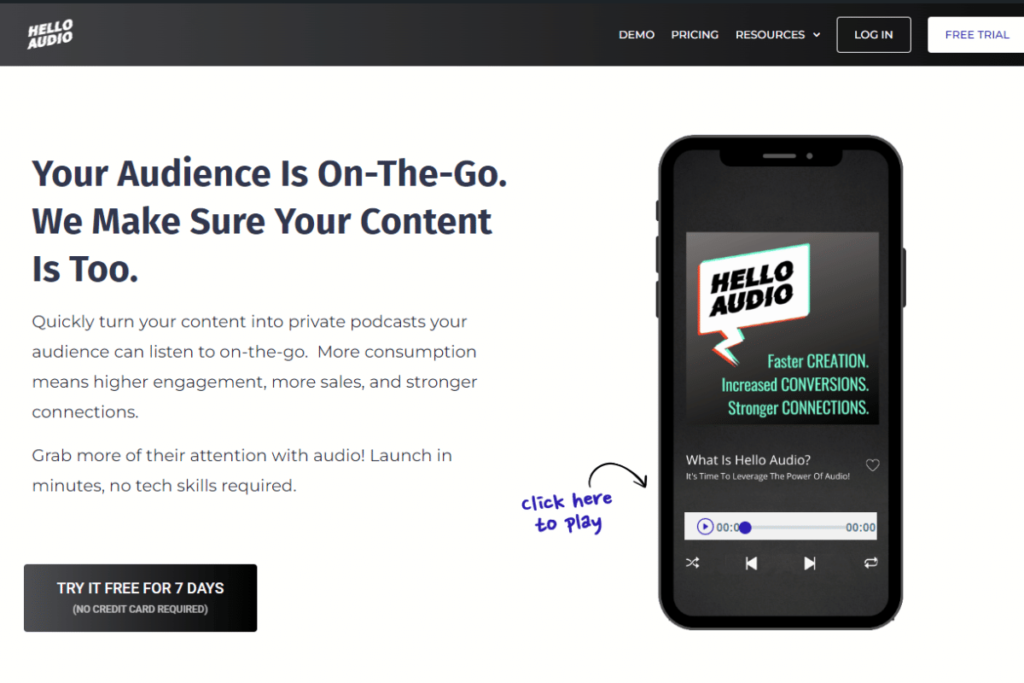
Hello Audio helps create a community of podcast fans by turning your existing media content (audio and video files) into engaging private podcasts.
The best thing is that Hello Audio’s user-friendly interface makes creating your podcast a breeze, regardless of your technical knowledge. Here’s how:
- You can simply drag and drop your content and customize it to make it unique.
- You can repurpose bulk videos into attention-grabbing audio bites in minutes.
- You can share pre/post-roll content with your audience to increase engagement.
- You can even track listener progress and gather valuable insights about their engagement.
Creators and businesses can use this information to improve their content further, send personalized recommendations, etc. Sign up for a 7-day FREE trial, and launch your first podcast with Hello Audio today.
2. Reddit
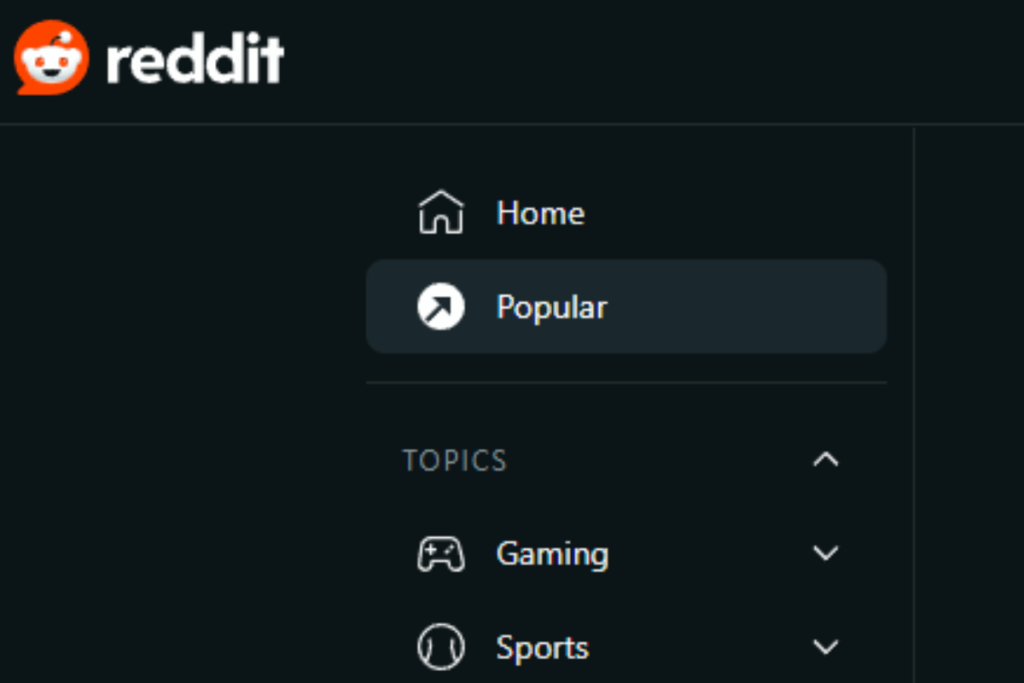
Reddit has an unmatched audience reach of 1.6 billion active monthly users spread over 3.4 million active subreddits. You can find people with similar interests by communicating via existing communities or by starting your own subreddit.
Reddit thrives on open discussions and user-generated content. Posts, comments, and self-hosted AMAs (Ask Me Anything) are great ways to share knowledge while establishing authority.
However, building an active Reddit community takes time, constant interaction, and adjustment to the platform’s constantly changing trends.
3. Discord
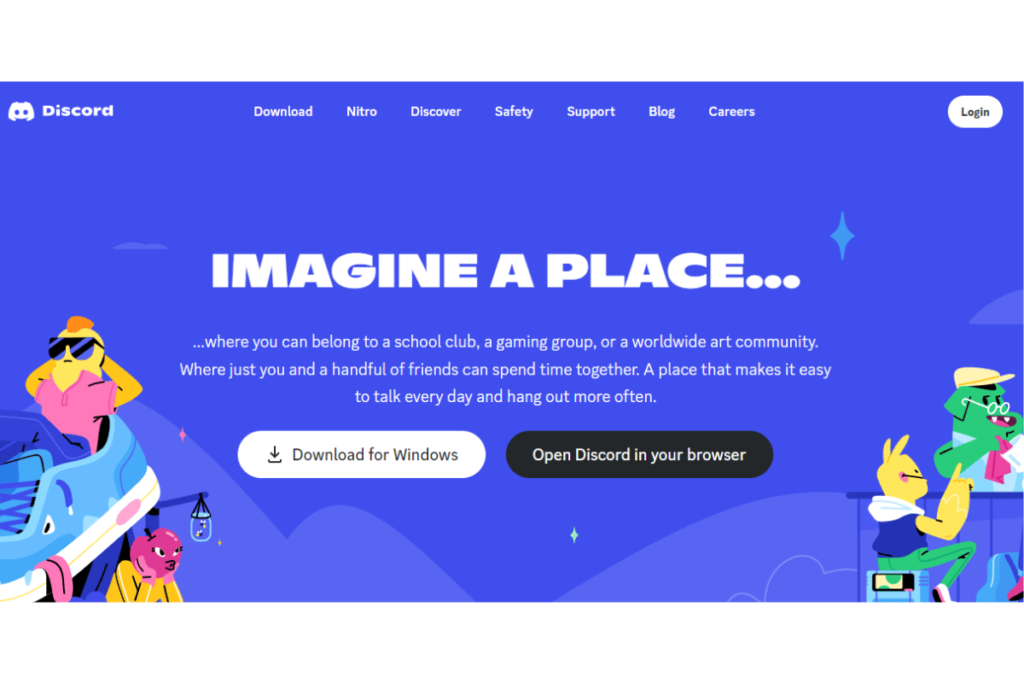
Discord emphasizes heavily on real-time interactions. It has multiple features that provide a complete environment for building tight-knit communities based on common interests. Just like Reddit, it allows users to form niche groups around specific topics.
However, Discord’s real-time approach may not suit all types of content or audiences. Being primarily interactive, it may not be the best platform for long-form content or thought leadership.
4. Facebook Groups

Facebook Groups give you access to the largest possible audience among social media platforms. It’s extremely simple to use, and most users are already familiar with their interface, thereby reducing the learning curve for both admins and members.
However, the platform also has some cons. It does not offer advanced customization or dedicated content management features to support community building.
On top of that, Facebook might not be the best option for creating private communities due to data ownership controversies.
5. Discourse
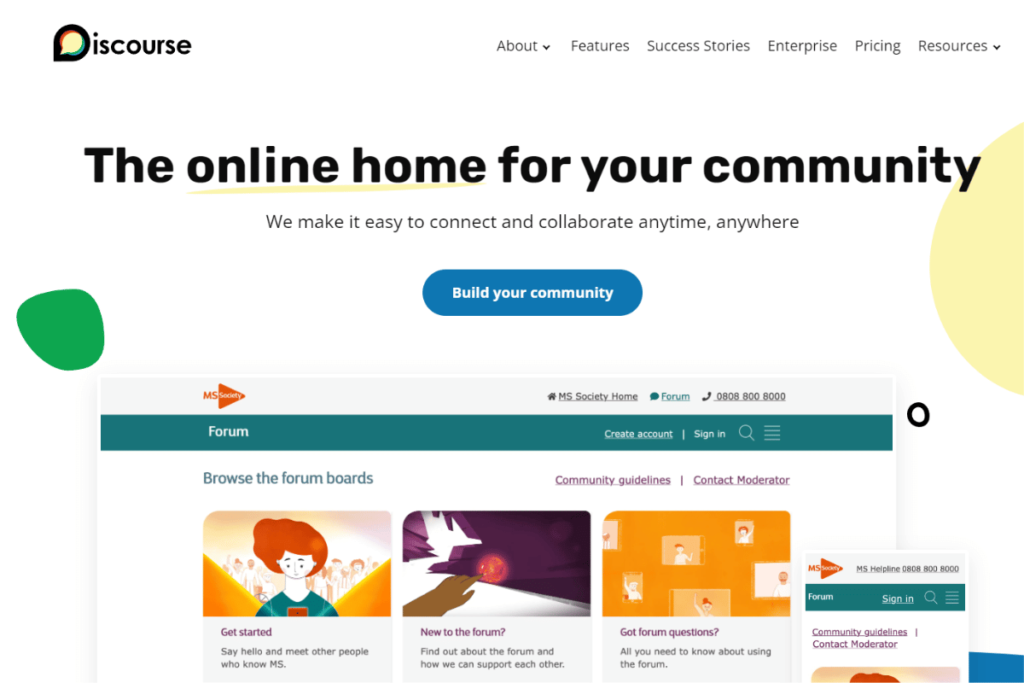
Self-hosted and open-source, Discourse is the perfect platform for communities that value flexibility and personalization.
Its broad feature set includes forums, wikis, chat, and powerful user management features. Discourse is also renowned for emphasizing user trust and reputation, having a clear UI, and focusing on long-form dialogues.
Not all users are technical, though. Because its payment model also revolves around managed service packages or self-hosting, it is less user-friendly than its subscription-based alternatives.
6. Mighty Networks
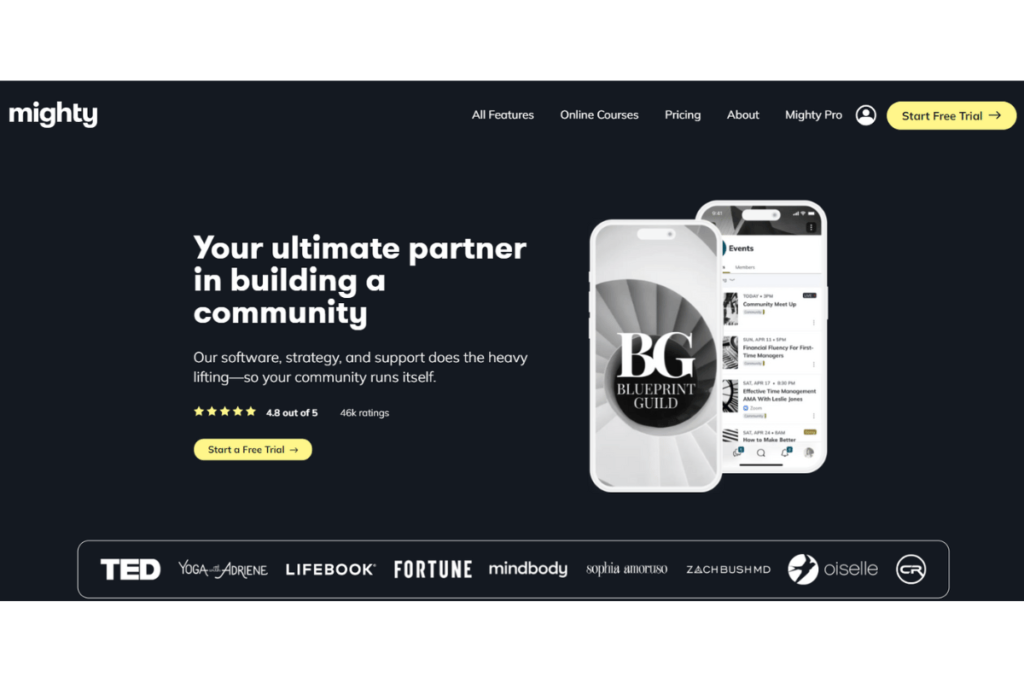
Mighty Networks brings social media and learning management system components under one roof.
It promotes interaction through a mix of discussion boards, live events, and course delivery. Creators who want to develop membership-based communities would greatly benefit from this. With Mighty Networks’ extensive data ownership and powerful monetization options, creators can also launch sustainable independent businesses.
However, its feature set has a steeper learning curve than simpler platforms. Its focus on paid memberships can also be a community-building obstacle.
7. Thinkific
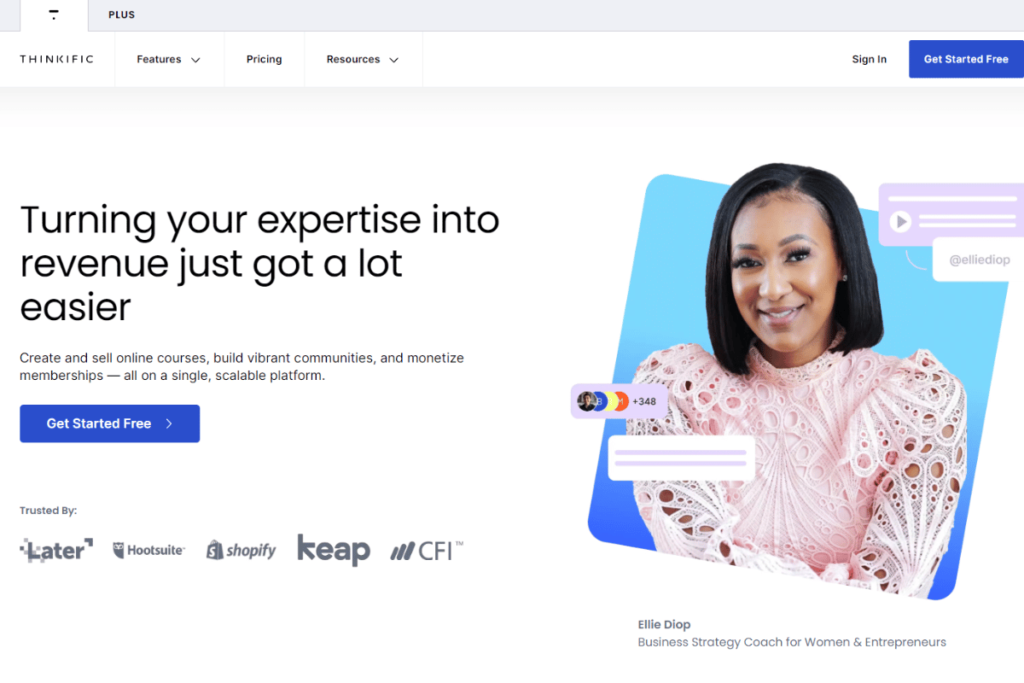
Thinkific is exceptional in combining course design with community features. Thanks to its all-inclusive platform, you can launch branded online courses, run live webinars, and create an active community centered on your educational materials.
Here’s why Thinkific makes a great community platform:
- Integrates your community forum, live events, and courses in one place for seamless learning/engagement.
- Segments your community based on course progress, interests, etc., for personalized, targeted engagement.
- Monetizes premium content as course add-ons for creators to generate extra revenue.
However, Thinkific’s community features may appear basic compared to other community platforms. Its pricing can also get on the heavier side for larger communities.
8. Kajabi
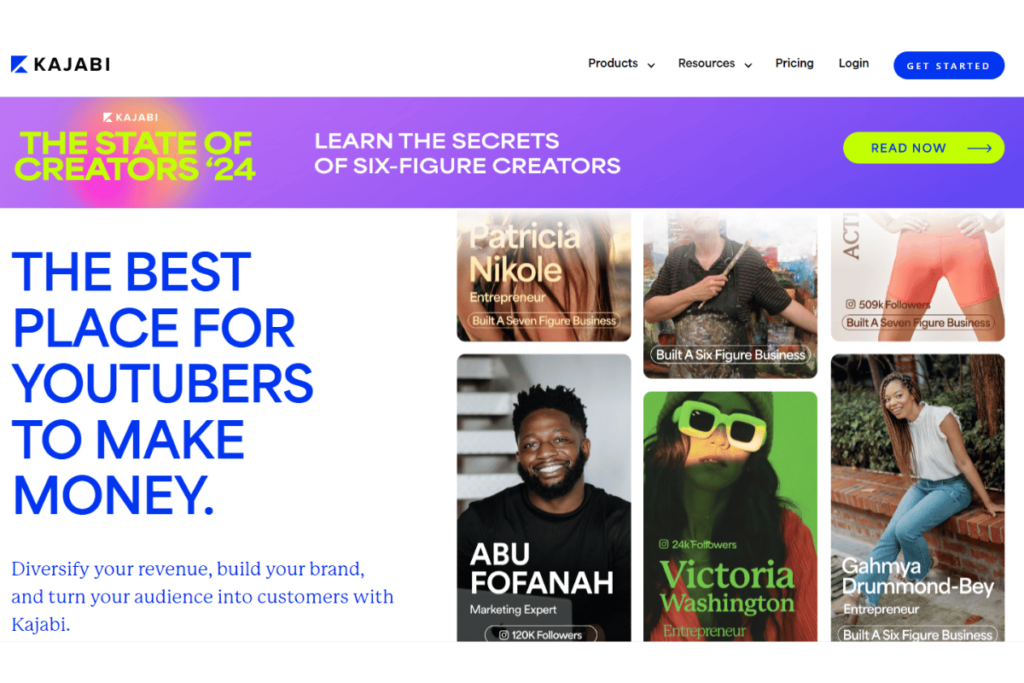
Looking for a one-stop shop for an online business that includes communities, memberships, marketing tools, and courses? Kajabi fits the description. Here’s why creators should try Kajabi:
- Streamlines workflows (courses, memberships, community management, etc.) into a single platform.
- Creates high-converting landing pages to bring in new members and highlight your community’s value proposition.
- Automates email sequences for welcoming new members, nurturing leads, and encouraging community participation.
- Gather useful data on member activity, engagement, and conversion rates to help you improve your community strategy.
9. Circle
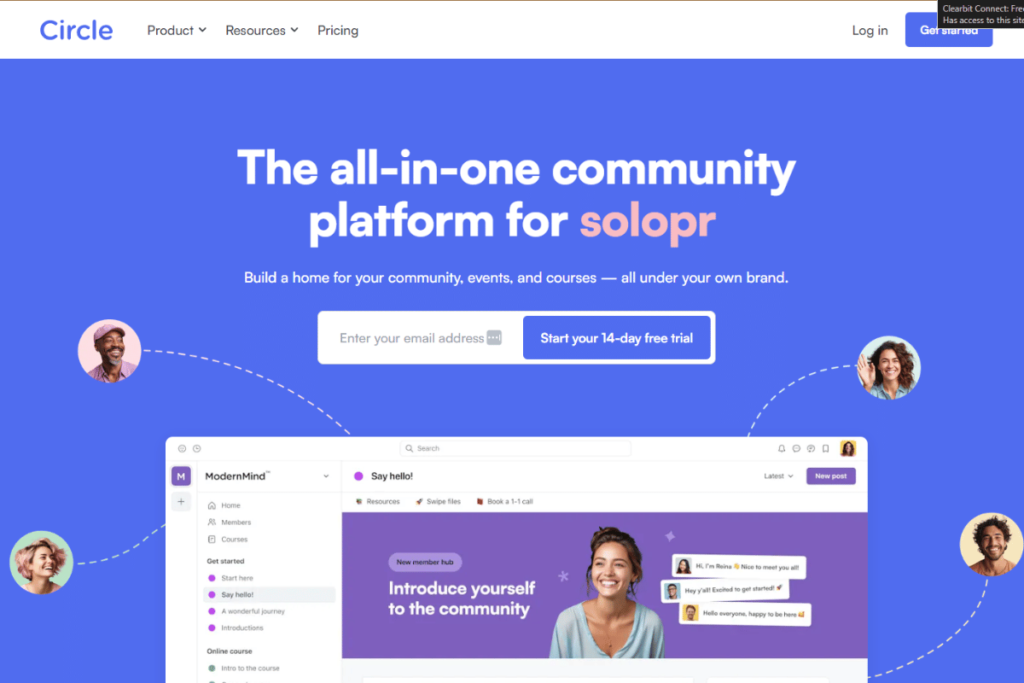
Circle, an all-in-one platform for coaches, highly values member connections and encourages deep dialogue.
With features like group chats, shared workspaces, and virtual conference rooms, its user-friendly layout is perfect for encouraging cooperation and teamwork. Circle is a great option for sensitive communities or private conversations because it emphasizes establishing a secure and private environment.
However, competing platforms offer advanced features like marketing automation, hosting courses, and more. Circle’s feature set feels very limited in comparison.
10. Bettermode (formerly Tribe)

Bettermode (formerly known as Tribe) is a highly customizable customer community platform that helps creators and online course creators build active, paid communities.
The platform’s main strength is its gated content features, which allow creators to offer tiered subscriptions with exclusive access. It also raises the bar for virtual cohort-based learning with features like group coaching and peer feedback.
However, Bettermode may not be the best fit for free, open-forum communities due to its keen focus on building paid communities.
11. Peerboard
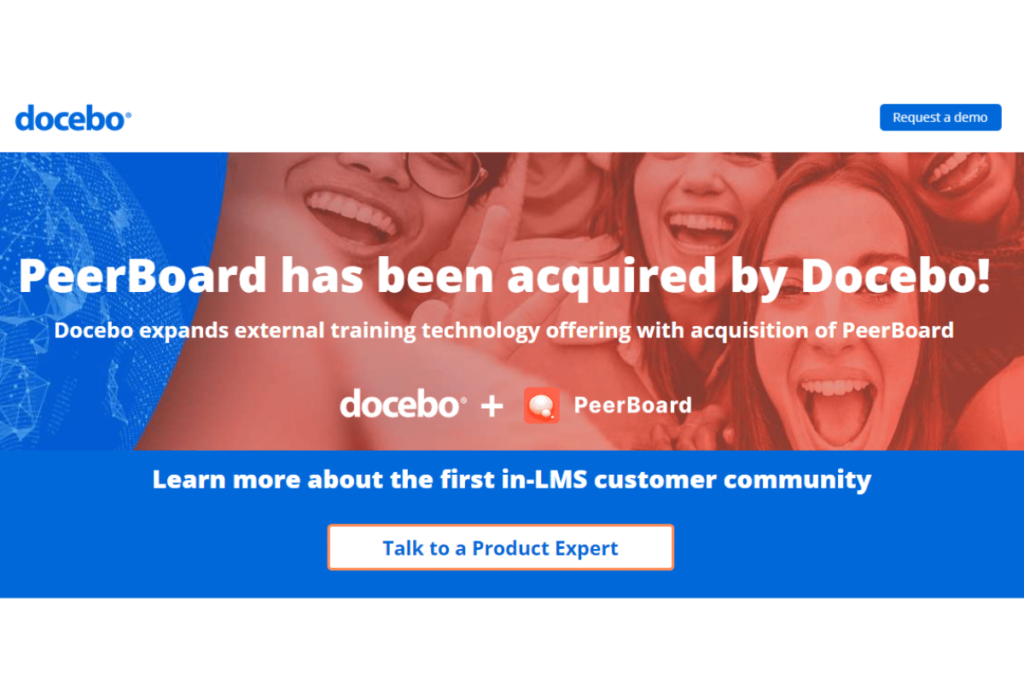
As the name suggests, Peerboard is a dynamic platform that prioritizes peer-to-peer learning and mentorship.
Its key features include knowledge-sharing forums where members can ask and answer questions and mentorship programs that match experienced members with newbies. That said, Peerboard is ideal for groups centered on professional growth and talent sharing.
12. Podia
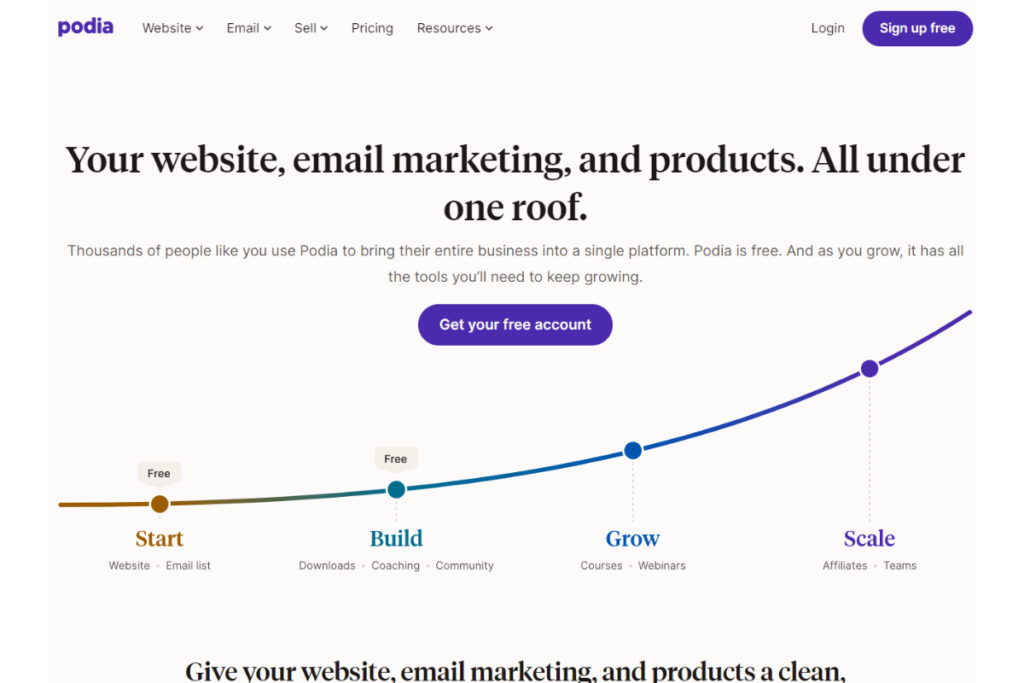
Our final pick, Podia, is primarily an online course and membership marketplace with community elements available as an add-on. Because of this, it’s a solid choice for creators looking to increase engagement with their already-established audience through community.
Podia’s community tools include discussion boards, live chat, and member directories. But its features could appear rudimentary and lack sophisticated tools for running bigger communities, compared to platforms like Hello Audio or Reddit.
5 Pitfalls to Avoid When Choosing Online Community Apps
The community platform you choose can either make or break your brand—picking one from so many capable options isn’t easy either.
If you want your community to take off and thrive, avoid these five crucial mistakes:
1. Not Knowing Clear Objectives
Before going into core platform features, first understand your community’s purpose.
Ask yourself – what are your goals? Is it establishing a safe space for like-minded people to interact, encouraging professional collaboration, or developing a support system for a particular cause?
Selecting the right online community platform becomes easier once you have clearly defined goals. This way, you can select a platform that both supports your vision and meets your community’s unique demands.
2. Ignoring User Experience and Interface Design
User engagement relies heavily on an intuitive and visually appealing interface.
A clumsy interface with hidden functionalities and unappealing design will frustrate consumers and restrict engagement. Your community platform needs a clear, easy-to-use interface for smooth interaction and browsing; it’s non-negotiable.
That said, always choose platforms that allow you to customize the experience and reflect your community’s unique personality.
3. Overlooking Privacy and Security Concerns
A data breach can quickly erode confidence and undermine your community’s basis.
That said, protecting your community members’ data should be your top priority to gain their trust. Choose a community platform with strong security features, like data encryption and solid user authentication procedures. Make your data collection/usage practices transparent. Lastly, align with all applicable data privacy regulations.
4. Failing to Consider Scalability and Flexibility
As your community increases, so will your needs. Community platforms with the scalability to handle growing user populations and engagement levels should be your top choice.
Make sure you don’t outgrow your chosen platform too soon by signing up for platforms that offer flexible membership plans or upgrade choices. If it offers built-in features/connectors that can adapt to your community’s evolving demands and activities, that’s a plus.
5. Neglecting Community Engagement and Management Tools
Lastly, constant engagement and establishing a welcoming and inclusive environment are key to any thriving online community.
Yes, an online community can only thrive if managed well and actively participated in. Select a platform with everything you need to plan events, steer conversations, measure member engagement, and promote communication.
Use polls, surveys, and feedback channels to collect helpful information and personalize your community activities.

Frequently Asked Questions (FAQs)
Before we leave, here’s our take on the most frequently asked questions about online community platforms:
Which Trends Are Evolving Online Community Platforms?
First, platforms are incorporating AI and data analytics to personalize content and experiences for individual members. These systems integrate effortlessly with marketing, CRM, and analytics solutions to improve management and insights.
Second, micro-niche communities are also gaining popularity as they provide greater interaction and targeted engagement. Finally, podcasts and audio-based interactions are becoming increasingly popular for building connection and engagement.
Learn how to create and start your podcast in minutes to maximize reach with Hello Audio.
How Can Online Community Platforms Drive Business Growth?
Communities facilitate direct feedback, helping brands better understand customer needs and preferences.
Active communities can also contribute to content co-creation by providing unique insights. Finally, these platforms can generate leads and conversions by giving relevant information and establishing trust with potential consumers.
Can Online Community Platforms be Monetized?
Yes, through exclusive content, early access, or premium features.
Even better, communities can sell merchandise, courses, or other products directly to members. Brands can also collaborate with communities to reach their target audience. Last, community data can be anonymized and sold to other businesses for valuable market research.
Conclusion
Our journey ends here. We’ve examined 12 robust online community platforms and tools with unique characteristics and features. Choose the platforms that align with your core needs, not the ones crammed with features you don’t need.
If you want to build authority for yourself or your business, add more value, private podcasts can be your best bet. From your audience’s perspective, it’s easy to consume and personal. From a business owner’s standpoint, it’s easier to create and can increase your reach significantly.
Convert your existing videos into engaging podcasts that people can listen to anywhere, any time, with Hello Audio. Sign up for a free trial to experience the power of audio-first engagement.




